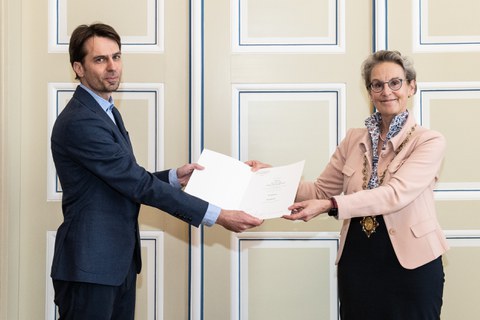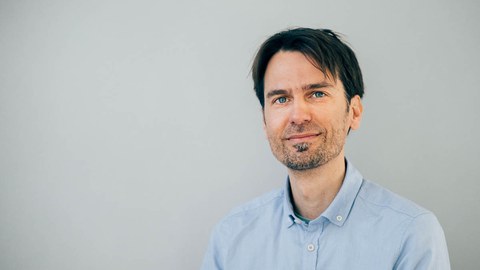Mar 02, 2022
Alf Honigmann Joins BIOTEC as Chair of Biophysics

Handover of the appointment certificate to Prof. Alf Honigmann by the Rector of TU Dresden, Prof. Ursula M. Staudinger, Feb. 28, 2022
Alf Honigmann was appointed as the Chair of Biophysics at the Biotechnology Center (BIOTEC) of the TU Dresden on March 1, 2022. The Honigmann research group studies how cells can control the shape of tissues.
Looking more closely at lungs, intestines, or blood vessels, one can realize that most of the body organs are actually made of a set of connected tubes and spheres. Prof. Alf Honigmann and his group study how individual cells come together to build such tubular and spherical tissues. To achieve that, the cells have to control their outer surface such that some parts of their membranes can stick to other cells, while others specialize in nutrient uptake and transport. The Honigmann group addresses cellular self-organization by combining several cutting-edge methods such as high-resolution microscopy, membrane biochemistry, and organoid models – mini organ-like tissues that are cultured in a laboratory Petri dish.
“I am very excited for my group to join the BIOTEC and the outstanding scientific environment of the Center for Molecular and Cellular Bioengineering campus. I am looking forward to contributing to an open-minded, collaborative, and interdisciplinary spirit of the institutes,” says Prof. Honigmann.
Prof. Honigmann and his group have recently successfully secured funding from the Human Frontier Science Program (HFSP) and the Volkswagen Foundation for two interdisciplinary projects on the interplay of physical forces and tissue shapes.
About Prof. Honigmann
Alf Honigmann studied cell biology and biophysics. His early mentors Richard Wagner and Wolfgang Junge at the University in Osnabrück sparked his interest in cell membrane organization. During his doctoral work, he used novel microscopy techniques to study the dynamics of single lipids and proteins in membranes. In 2011, he joined the Max Planck Institute for Biophysical Chemistry (MPI-BPC) in Göttingen and the team of Stefan Hell, a future Nobel Prize winner. During his postdoctoral work in Hell’s group, Alf Honigmann developed super-resolution microscopy tools to study the nanoscale structure of cell membranes. In 2015, Honigmann has established his own research group at the Max Planck Institute of Molecular Cell Biology and Genetics (MPI-CBG) in Dresden. In the last years, his team discovered a molecular mechanism that allows cells to build so-called tight junctions, barriers that seal our organ cavities from one another and prevent the entry of pathogens into our internal system.

